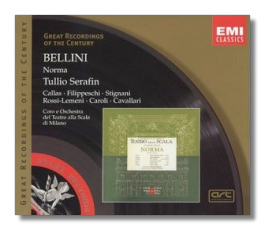
The Internet's Premier Classical Music Source
Related Links
- Bellini Reviews
- Latest Reviews
- More Reviews
-
By Composer
-
Collections
DVD & Blu-ray
Books
Concert Reviews
Articles/Interviews
Software
Audio
Search Amazon
Recommended Links
Site News
 CD Review
CD Review
Vincenzo Bellini

Norma
- Maria Callas (Norma)
- Mario Filippeschi (Pollione)
- Ebe Stignani (Adalgisa)
- Nicola Rossi-Lemeni (Oroveso)
- Paolo Caroli (Flavio)
- Rina Cavallari (Clotilde)
Orchestra & Chorus of La Scala, Milan/Tullio Serafin
EMI Classics 5 62642 2 ADD monaural 3CDs: 62:10, 27:58, 70:19
Although it's been almost fifty years since it was recorded, this Norma, monaural sound and all, still holds an honored place in the catalog. Without a doubt, it belongs in EMI Classics' "Great Recordings of the Century" series, and the obvious question to ask now is, "What took EMI Classics so long?"
I have to put my prejudices on the table. I think Norma is a second-rate opera, if only because it depends on once-in-a-lifetime singers for its success. (You'll seldom hear your local opera company attempt Norma, while La bohème and Carmen are perpetual fair game.) Furthermore, although this 1954 recording may be the best the opera has received, Serafin's conducting is nothing special and Callas's co-stars are arthritic, woofy or pedestrian, and simply outclassed in every way. (Nice work from La Scala's orchestra and chorus, though.)
But Callas! She is the best reason to hear this particular recording… and maybe even this opera. (OK, OK, a couple of other sopranos have made powerful recordings of "Casta diva," and I wouldn't want to be without Ezio Pinza's Columbia recording of "Ite sul colle, o Druidi.") Norma quickly became one of Callas' signature roles; she performed it more than 90 times between 1948 and 1965. In 1954, she was just about at her vocal peak. She recorded it a second time in 1960, and although that recording is even more dramatically nuanced, her voice had become wobbly and undependable by then. (That second recording boasts a superior Pollione in Franco Corelli, and Christa Ludwig's intelligent but not very Italianate Adalgisa.) If you are looking for a lesson on how the seemingly placid conventions and endless decorations of bel canto can be transformed into white-knuckle drama, there's no teacher like Callas' Norma.
When this recording was last released on LPs, it required only two of them, so here's a rare example of a set in which CDs appear uneconomical compared to the newer medium. However, the LP sides were some 40-minutes long, with a resulting loss in dynamic range, so I don't mind the "uncompacting" of these compact discs, although it is odd to have a CD with a total playing time of 27:58! The sound is good, but it shows its age in climaxes. The booklet contains texts, translations, and Richard Osborne's essay, which puts this release into its appropriate context.
Copyright © 2004, Raymond Tuttle


















